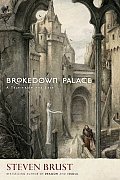
| Publisher: | Orb |
| Copyright: | 1986 |
| Printing: | September 2006 |
| ISBN: | 0-7653-1504-1 |
| Format: | Trade paperback |
| Pages: | 351 |
The ruling family of the kingdom of Fenario consists of four brothers. The oldest, László, is king. He's devoted to the kingdom, but far too touchy. Andor is a scholar of sorts, but one without a focus for his attention. Vilmos is not a scholar of any sort: he's a giant who acts a bit dim and spends the rest of his time caring for pet norska (think rabbits). Miklós, the youngest... well, he's the subject of this tale.
Brokedown Palace starts as a coming-of-age story with a strong fairy tale feel. It opens with a legend, introduces us to the players and the castle at the heart of Fenario (and of this story), and then shows us Miklós, rescued from the River after a beating by his elder brother. After a searching (and background-establishing) discussion with a táltos horse, Miklós decides to leave Fenario and go into Faerie, source of the River he's loved since he was a child. When he returns, several years later, it's with new-found power, a somewhat different attitude, and the perspective needed to untangle the riddle and conflict at the heart of the kingdom.
The story felt a little simplistic in its opening chapters. The fairy tale feel is very strong in the tall-tale interludes, Miklós's sudden decision to leave Fenario, and a fairly random encounter with a dragon on his return. The characters all seem to fit naturally into stereotypes, particularly Vilmos. This is deceptive, though. By about the fifth chapter, the story starts developing emotional depth: Bölk reappears and turns out to be something other than a simple guide, the plot becomes more complex, and then all of the characters start growing within their fairy-tale framework. By the end of the book, it's turned into a wonderful story about change, transformation, family, and perspective, about recognizing beauty and how difficult it can be to see things outside of the framework one expects.
Brust is one of the best at using structural patterns to enhance stories. Here, he tells the story in alternating chapters, one from Miklós's perspective and one from the perspective of another major character, separated by very short legends, myths, and fables about Fenario. Those legendary interludes are often fun short stories in their own right, but they usually also have some subtle connection with the main story or explain some bit of background if one pays close enough attention. The alternating viewpoint of the longer chapters gets away from a pure coming-of-age presentation of Miklós and does a lot to complicate the reader's original picture of heroes and villains. Not everyone in the story becomes sympathetic, but everyone acquires justification and a moment of being a hero of their own story. It's a nice touch in a book about clashing conceptions of the world.
I find it hard to describe the tone of this book. It's very different than either the Vlad Taltos series or the Khaavren Romances. It's set in the Dragaeran world (Fenario will be familiar to readers of both series), but in the East. Faerie here is clearly the Dragaeran Empire if you know Brust's world, but that also doesn't matter for the story; Faerie never appears directly. The events and characters of the book obey a sort of symbolic and poetic logic, several of them standing for roles or archetypes, and the themes are built on familiar ground. However, the characters also seem aware of the roles they play and have rational justifications for them. It feels like the story one might get if one transplanted characters from well-written medieval fantasy into a fairy tale setting with a deeply ambiguous mythical and moral background, gave them a typical fairy tale theme, and let them repeatedly complicate it through their personal interactions.
All of this becomes extra fun for those who have read Brust's other work in the same broader universe. While Brokedown Palace stands well alone, there are tantalizing hints and clues for the broader world. The only major character it shares with the other Dragaeran series is the Demon Goddess, but Devera makes two wonderful appearances and there are other subtle connections and references. If you either don't mind spoilers or have already read the other Dragaeran books, the Lyorn Records do a great job of drawing your attention to the references and including bits that Brust has said or confirmed outside of the books. Brokedown Palace offers a very different angle on what is presumably the same basic systems of magic that we see in Vlad's series, and it's fun to try to work out the mappings. (For example, just what is Bölk in the Dragaeran cosmology?)
But the best part of this story is its heart. It's a gentle story, in that it doesn't try to scare you or wrench your emotions, but it's a deep and meaningful story that sneaks up on you. The characters and the problems seem to matter more and more as the book goes on, until you're rooting wholeheartedly for your favorites, trying to figure out what's happening and what should be happening, and hoping Miklós can figure out the right decisions. It starts slow, so give it some time, but I think it's a beautiful bit of storytelling.
Reviewed: 2009-01-17